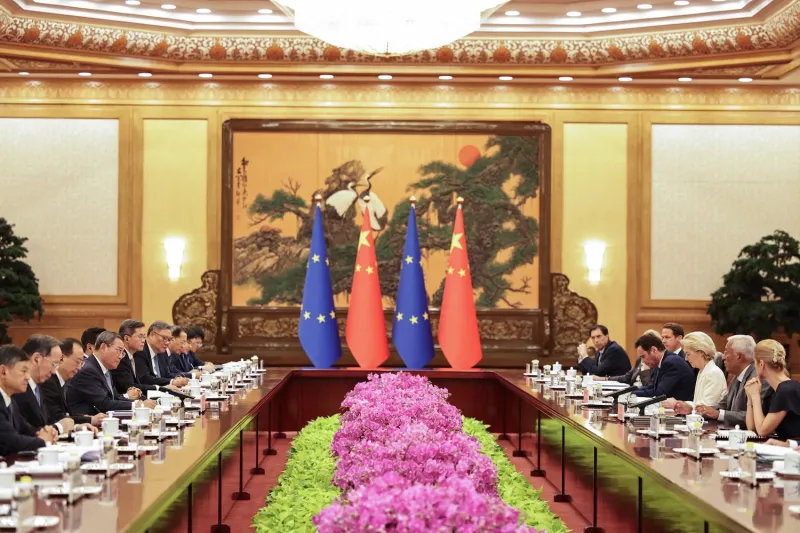Wang Huiyao: Only a multipolar coalition can secure Ukraine peace
SCMP | October 29 , 2025From SCMP, 2025-9-26
■ To move forward, negotiations must be conducted on the basis of security guarantees that reflect today’s geopolitical realities.
By Wang Huiyao | Founder of the Center for China and Globalization(CCG)
The now-delayed meeting between US President Donald Trump and his Russian counterpart Vladimir Putin in Budapest, Hungary, could have been a turning point towards peace in Ukraine. Instead, it has revealed a deeper fault line.
However, it is one that can be overcome. Even the Kremlin’s special envoy for investment and economic cooperation, Kirill Dmitriev, believes that the parties are close to an end to the war.
The global community should offer an off-ramp and seek a middle ground amenable to both sides. No ceasefire, however well-meaning, will work unless it factors in the deeper struggles around Europe’s security posture and Russia’s anxieties about the West. In short, what is needed is credible enforcement and balanced security guarantees.
In this regard, Kyiv rightly demands protection from future aggression. Meanwhile, Moscow insists on assurances that Nato, the transatlantic security alliance, will not creep closer to its border. The fact that the Budapest summit was even on the table indicates that both sides are, at least ostensibly, open to “freezing” the conflict. However, trust is running thin.
I have previously argued for the creation of a formal seven-party talks framework, reminiscent of the Korean six-party talks, comprising the UN Security Council’s five permanent members – the United States, France, Britain, China and Russia – plus Ukraine and representatives of the European Union. But now, an older precedent can offer guidance: the Korean Armistice Agreement of 1953 did not end the war, but it greatly reduced the violence.
Such an approach, if enacted with the help of neutral third-party oversight, could offer a viable path outside maximalist goals. If Ukraine and Russia are serious about halting the fighting, they will need to embrace a peacekeeping framework strong enough to deter violations but neutral enough to be accepted by both.
The delayed Budapest talks should not be read as the end of diplomacy, but as a chance to begin a more realistic process. Should talks proceed, a wider table might be found at the coming Asia-Pacific Economic Cooperation summit in Gyeongju, South Korea, this week. President Xi Jinping, Trump and a Russian delegation are expected to be there, as are leaders from across the Asia-Pacific, a region known for both conflict and reconciliation.
On the sidelines, an informal trilateral meeting could be convened to explore the outlines of a “Gyeongju Ceasefire Initiative”, paving the way for a formal peace conference under UN auspices that includes the organisation’s Security Council, Ukraine and the EU.
For Washington and Moscow, this would provide a dignified exit from confrontation. For Kyiv, it would offer concrete protection and a pathway to reconstruction. For Europe, it would reduce the strain of endless crisis management. And for the Global South, it would mark a long-overdue moment when emerging powers help shoulder the burdens of peace.
A carefully crafted freeze in hostilities could unlock humanitarian corridors, stabilise food and energy supplies, and help kick-start Ukraine’s recovery, a task that will require the industrial and financial capacities of both the West and Asia.
Some may dismiss this lofty proposal as idealistic, but the same might have been said of Germany and France being in the same political union or the Korean Armistice Agreement being mostly maintained over the years. Peace doesn’t have to come from mutual affection. It can grow from managed coexistence.
The delay of the Trump-Putin summit was not rooted in personal mistrust but rather the absence of the right frameworks to monitor and support badly needed security guarantees. That gap can and must be filled by the wider international community.
The war in Ukraine has reshaped global politics and strained institutions that were designed for another era. If the UN and Brics can forge a credible peacekeeping framework that freezes violence while enabling negotiations, the outcome would not only save Ukrainian lives but also show that global cooperation can triumph over great-power competition.
A truce enforced by shared responsibility is better than a victory won with exhaustion and needlessly filled graves. Diplomacy without design cannot endure. The world should seize the moment before it slips away. In Gyeongju, the US, Russia, China and other partners have a chance to chart a path away from attrition and towards stability.
From SCMP, 2025-10-29
Recommended Articles
-

Wang Huiyao: Beyond Blocs-Europe and China will not align nor compete, but selectively cooperate
-
Wang Huiyao: Key lessons from China’s ascent over the past 25 years
-
Wang Huiyao: Key lessons from China’s ascent over the past 25 years
-
Wang Huiyao: China and Latin America: Partners in a shared new era
-
Wang Huiyao: Only a multipolar coalition can secure Ukraine peace